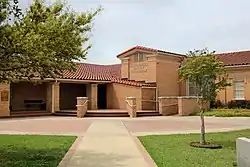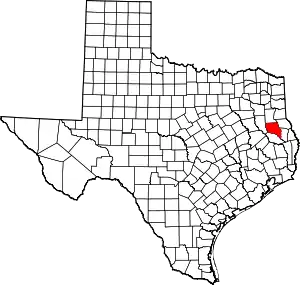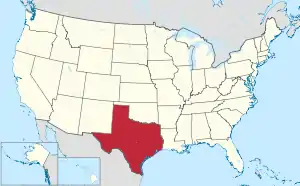Nacogdoches County | |
|---|---|
 The Nacogdoches County Courthouse | |
 Location within the U.S. state of Texas | |
 Texas's location within the U.S. | |
| Coordinates: 31°37′N 94°37′W / 31.61°N 94.61°W | |
| Country | |
| State | |
| Founded | 1837 |
| Named for | Nacogdoche people |
| Seat | Nacogdoches |
| Largest city | Nacogdoches |
| Area | |
| • Total | 981 sq mi (2,540 km2) |
| • Land | 947 sq mi (2,450 km2) |
| • Water | 35 sq mi (90 km2) 3.5% |
| Population (2020) | |
| • Total | 64,653 |
| • Density | 66/sq mi (25/km2) |
| Time zone | UTC−6 (Central) |
| • Summer (DST) | UTC−5 (CDT) |
| Congressional district | 17th |
| Website | www |
Nacogdoches County (/ˌnækəˈdoʊtʃɪs/ NAK-ə-DOH-chiss) is a county located in the U.S. state of Texas. As of the 2020 census, its population was 64,653.[1] Its county seat is Nacogdoches.[2]
The Nacogdoches, Texas micropolitan statistical area includes all of Nacogdoches County.
Nacogdoches hosts the Blueberry Festival in June. The county is the top blueberry producer in Texas and is headquarters for the Texas Blueberry Marketing Association. It tagged itself as the "Capital of the Texas Forest Country".[3]
History
The county was created in 1826 as a municipality of Mexico and organized as a county in 1837.[4][5]
Geography
According to the U.S. Census Bureau, the county has a total area of 981 square miles (2,540 km2), of which 35 square miles (91 km2) (3.5%) are covered by water.[6]
Adjacent counties
- Rusk County (north)
- Shelby County (northeast)
- San Augustine County (southeast)
- Angelina County (south)
- Cherokee County (west)
National protected area
- Angelina National Forest (part)
Demographics
| Census | Pop. | Note | %± |
|---|---|---|---|
| 1850 | 5,193 | — | |
| 1860 | 8,292 | 59.7% | |
| 1870 | 9,614 | 15.9% | |
| 1880 | 11,590 | 20.6% | |
| 1890 | 15,984 | 37.9% | |
| 1900 | 24,663 | 54.3% | |
| 1910 | 27,406 | 11.1% | |
| 1920 | 28,457 | 3.8% | |
| 1930 | 30,290 | 6.4% | |
| 1940 | 35,392 | 16.8% | |
| 1950 | 30,326 | −14.3% | |
| 1960 | 28,046 | −7.5% | |
| 1970 | 36,362 | 29.7% | |
| 1980 | 46,786 | 28.7% | |
| 1990 | 54,753 | 17.0% | |
| 2000 | 59,203 | 8.1% | |
| 2010 | 64,524 | 9.0% | |
| 2020 | 64,653 | 0.2% | |
| U.S. Decennial Census[7] 1850–2010[8] 2010[9] 2020[10] | |||
| Race / Ethnicity | Pop 2010[9] | Pop 2020[10] | % 2010 | % 2020 |
|---|---|---|---|---|
| White alone (NH) | 39,699 | 37,158 | 61.53% | 57.47% |
| Black or African American alone (NH) | 11,573 | 10,567 | 17.94% | 16.34% |
| Native American or Alaska Native alone (NH) | 230 | 191 | 0.36% | 0.30% |
| Asian alone (NH) | 775 | 760 | 1.20% | 1.18% |
| Pacific Islander alone (NH) | 15 | 10 | 0.02% | 0.02% |
| Some other race alone (NH) | 54 | 190 | 0.08% | 0.29% |
| Mixed/multiracial (NH) | 822 | 2,180 | 1.27% | 3.37% |
| Hispanic or Latino (any race) | 11,356 | 13,597 | 17.60% | 21.03% |
| Total | 64,524 | 64,653 | 100.00% | 100.00% |
Note: the US Census treats Hispanic/Latino as an ethnic category. This table excludes Latinos from the racial categories and assigns them to a separate category. Hispanics/Latinos can be of any race.
As of the census[11] of 2000, 59,203 people, 22,006 households, and 14,039 families resided in the county. The population density was 62 people per square mile (24 people/km2). The 25,051 housing units had an average density of 26 units per square mile (10 units/km2). The racial makeup of the county was 75.00% White, 16.74% African American, 0.39% Native American, 0.70% Asian, 0.07% Pacific Islander, 5.70% from other races, and 1.41% from two or more races. About 11.25% of the population were Hispanics or Latinos of any race.
Of the 22,006 households, 30.5% had children under 18 living with them, 48.3% were married couples living together, 11.8% had a female householder with no husband present, and 36.2% were not families. About 27.6% of all households were made up of individuals, and 9.3% had someone living alone who was 65 or older. The average household size was 2.49, and the average family size was 3.08.
In the county, the age distribution was 24.0% under the age of 18, 20.0% from 18 to 24, 24.7% from 25 to 44, 19.2% from 45 to 64, and 12.1% who were 65 or older. The median age was 30 years. For every 100 females, there were 93.00 males. For every 100 females 18 and over, there were 89.00 males.
The median income for a household in the county was $28,301, and for a family was $38,347. Males had a median income of $29,502 versus $21,422 for females. The per capita income for the county was $15,437. About 15.50% of families and 23.30% of the population were below the poverty line, including 27.10% of those under 18 and 13.90% of those 65 or over.
Transportation
Bus
Greyhound Lines operates the Nacogdoches Station at the Kerrville Bus Company station in Nacogdoches.[12]
Major highways
 U.S. Highway 59
U.S. Highway 59
.svg.png.webp) Interstate 69 is currently under construction and will follow the current route of U.S. 59 in most places.
Interstate 69 is currently under construction and will follow the current route of U.S. 59 in most places.
 U.S. Highway 259
U.S. Highway 259 State Highway 7
State Highway 7 State Highway 21
State Highway 21 State Highway 103
State Highway 103 State Highway 204
State Highway 204 Farm to Market Road 95
Farm to Market Road 95 Farm to Market Road 225
Farm to Market Road 225 Farm to Market Road 226
Farm to Market Road 226
Communities
Cities
- Appleby
- Chireno
- Cushing
- Garrison
- Nacogdoches (county seat and largest municipality)
Census-designated place
Unincorporated communities
Education
School districts:[13]
- Central Heights Independent School District
- Chireno Independent School District
- Cushing Independent School District
- Douglass Independent School District
- Garrison Independent School District
- Martinsville Independent School District
- Nacogdoches Independent School District
- Woden Independent School District
The county is in the district for Angelina College.[14]
Etoile Independent School District, which formerly served parts of the county,[15] merged into Woden ISD in 2022.[16]
Notable residents
- Clint Dempsey, professional soccer player
- John H. Hannah Jr. - U.S. District Court judge
- Ron Raines, actor
Politics
| Year | Republican | Democratic | Third party | |||
|---|---|---|---|---|---|---|
| No. | % | No. | % | No. | % | |
| 2020 | 17,378 | 64.88% | 9,000 | 33.60% | 407 | 1.52% |
| 2016 | 14,771 | 65.29% | 6,846 | 30.26% | 1,005 | 4.44% |
| 2012 | 13,925 | 67.42% | 6,465 | 31.30% | 263 | 1.27% |
| 2008 | 14,828 | 63.39% | 8,393 | 35.88% | 170 | 0.73% |
| 2004 | 14,160 | 65.96% | 7,152 | 33.32% | 154 | 0.72% |
| 2000 | 13,145 | 66.39% | 6,204 | 31.33% | 450 | 2.27% |
| 1996 | 10,361 | 53.25% | 7,641 | 39.27% | 1,456 | 7.48% |
| 1992 | 9,864 | 45.58% | 6,937 | 32.05% | 4,842 | 22.37% |
| 1988 | 11,767 | 62.32% | 6,886 | 36.47% | 230 | 1.22% |
| 1984 | 13,063 | 69.44% | 5,694 | 30.27% | 55 | 0.29% |
| 1980 | 8,626 | 56.94% | 5,981 | 39.48% | 543 | 3.58% |
| 1976 | 7,315 | 51.73% | 6,697 | 47.36% | 129 | 0.91% |
| 1972 | 8,757 | 70.41% | 3,656 | 29.40% | 24 | 0.19% |
| 1968 | 3,235 | 32.74% | 3,449 | 34.91% | 3,196 | 32.35% |
| 1964 | 2,976 | 39.58% | 4,524 | 60.17% | 19 | 0.25% |
| 1960 | 3,042 | 45.19% | 3,522 | 52.32% | 168 | 2.50% |
| 1956 | 3,285 | 53.28% | 2,855 | 46.31% | 25 | 0.41% |
| 1952 | 2,891 | 44.84% | 3,556 | 55.16% | 0 | 0.00% |
| 1948 | 833 | 18.37% | 3,195 | 70.47% | 506 | 11.16% |
| 1944 | 319 | 7.63% | 3,226 | 77.14% | 637 | 15.23% |
| 1940 | 440 | 8.10% | 4,988 | 91.83% | 4 | 0.07% |
| 1936 | 209 | 4.87% | 4,075 | 95.01% | 5 | 0.12% |
| 1932 | 117 | 3.14% | 3,603 | 96.70% | 6 | 0.16% |
| 1928 | 822 | 30.41% | 1,879 | 69.52% | 2 | 0.07% |
| 1924 | 204 | 5.56% | 3,418 | 93.16% | 47 | 1.28% |
| 1920 | 238 | 8.73% | 1,794 | 65.79% | 695 | 25.49% |
| 1916 | 92 | 4.60% | 1,766 | 88.21% | 144 | 7.19% |
| 1912 | 94 | 4.48% | 1,614 | 77.00% | 388 | 18.51% |
See also
References
- ↑ "Nacogdoches County, Texas". United States Census Bureau. Retrieved January 30, 2022.
- ↑ "Find a County". National Association of Counties. Retrieved June 7, 2011.
- ↑ "Nacogdoches County | Texas Forest Country". texasforestcountry.com. Retrieved January 23, 2023.
- ↑ "Texas: Individual County Chronologies". Texas Atlas of Historical County Boundaries. The Newberry Library. 2008. Retrieved May 28, 2015.
- ↑ "Nacogdoches County". Texas Almanac. Texas State Historical Association. Retrieved June 23, 2015.
- ↑ "2010 Census Gazetteer Files". United States Census Bureau. August 22, 2012. Retrieved May 5, 2015.
- ↑ "Decennial Census of Population and Housing by Decades". US Census Bureau.
- ↑ "Texas Almanac: Population History of Counties from 1850–2010" (PDF). Texas Almanac. Archived (PDF) from the original on October 9, 2022. Retrieved May 5, 2015.
- 1 2 "P2 HISPANIC OR LATINO, AND NOT HISPANIC OR LATINO BY RACE - 2010: DEC Redistricting Data (PL 94-171) - Nacogdoches County, Texas". United States Census Bureau.
- 1 2 "P2 HISPANIC OR LATINO, AND NOT HISPANIC OR LATINO BY RACE - 2020: DEC Redistricting Data (PL 94-171) - Nacogdoches County, Texas". United States Census Bureau.
- ↑ "U.S. Census website". United States Census Bureau. Retrieved May 14, 2011.
- ↑ ""Greyhound.com | Locations : States : Texas". Archived from the original on August 15, 2012. Retrieved July 30, 2012.." Greyhound Lines. Retrieved on July 29, 2012. NOTE: The information for Nacogdoches appears as a pop-up window.
- ↑ "2020 CENSUS - SCHOOL DISTRICT REFERENCE MAP: Nacogdoches County, TX" (PDF). U.S. Census Bureau. Archived (PDF) from the original on October 9, 2022. Retrieved July 1, 2022. - Text list
- ↑ Texas Education Code, Sec. 130.165. ANGELINA COUNTY JUNIOR COLLEGE DISTRICT SERVICE AREA..
- ↑ Texas Education Agency: See map of Nacogdoches County. Retrieved on July 3, 2022.
- ↑ "CONSOLIDATIONS, ANNEXATIONS AND NAME CHANGES FOR TEXAS PUBLIC SCHOOLS" (PDF). Texas Education Agency. Archived (PDF) from the original on October 9, 2022. Retrieved July 1, 2022.
- ↑ Leip, David. "Dave Leip's Atlas of U.S. Presidential Elections". uselectionatlas.org. Retrieved July 28, 2018.
Further reading
- Roth, Jeffery, and J. B. Watson Jr., “African-American Education in Nacogdoches County, 1890–1970,” East Texas Historical Journal, 51 (Spring 2013), 9–23